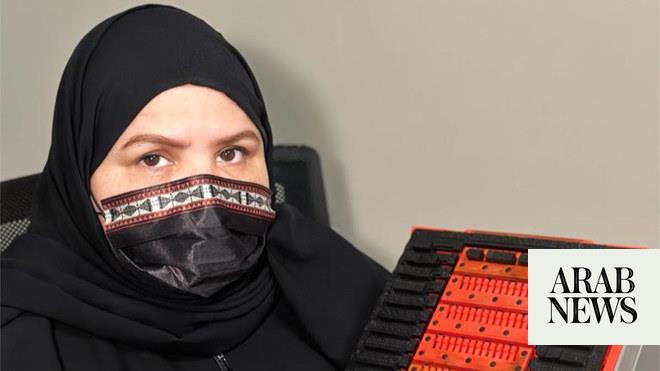
Desire to inspire positive change led to project’s success
RIYADH: Six female students at Prince Sultan University have developed an accessibility attachment that can help to provide better spatial awareness for the visually impaired.
Percevo was more than just a class project, but resulted from the enthusiasm of the students at the College of Computer and Information Sciences.
Raneem Al-Soby, Aisha Ashworth, Haifa Eddin, Asma Khan, Danna Bakkr, and Dana Elhaj created their innovative device under the guidance of their supervisors, Dr. Anees Ara and Prof. Tanzila Saba.
Their efforts paid off when Percevo won the first prize at the CCIS Expo at Prince Sultan University and was showcased at LEAP 2024, which Al-Soby said was “a validation of our hard work and dedication.” (Supplied)
Al-Soby told Arab News: “Our group was driven by the desire to make a positive change using the skills we’ve developed and the knowledge we’ve gained.”
The team saw an opportunity to enhance the traditional white cane used by the visually impaired, which has remained largely unchanged since its invention in 1921.
Al-Soby’s personal connection to vision impairment through her sister and a colleague’s visually impaired grandfather further fueled their commitment.
Our group was driven by the desire to make a positive change using the skills we’ve developed and the knowledge we’ve gained.
Raneem Al-Soby, Prince Sultan University student
The process of designing Percevo was meticulous, the team said. They started off with extensive research on existing technologies and looked at the common challenges faced by visually impaired individuals.
They created diagrams and built virtual circuits to ensure compatibility of physical components. Understanding the importance of comfort, they designed an ergonomic bent handle for natural wrist movement.
They created diagrams and built virtual circuits to ensure compatibility of physical components. (Supplied)
The entire project, from system design to a working prototype, took about three months to develop.
Their efforts paid off when Percevo won the first prize at the CCIS Expo at Prince Sultan University and was showcased at LEAP 2024, which Al-Soby said was “a validation of our hard work and dedication.”
Al-Soby added: “We wanted to develop a device that’s not only functional but also accessible and affordable for those who need it the most.”
Percevo uses a discreet camera and sensors to provide spatial awareness, recognizing objects and locations in real time. The camera detects and comprehends objects and conveys the information to the user through voice prompts, creating an experience akin to having a constant companion. It achieves this through the use of a microcomputer and artificial intelligence algorithms for identification.
Al-Soby said: “As we developed Percevo we made sure to incorporate sustainable practices. Using eco-friendly materials and rechargeable batteries was a crucial part of our design philosophy.”
Percevo is also designed as an attachment to the classic white cane, allowing users to upgrade without discarding their existing cane. This approach not only promotes eco-consciousness but also ensures ease of use and cost-effectiveness for users.
The students plan to expand their dataset for better object detection and will involve end users through surveys and feedback channels.
“We’re dedicated to continuous improvement,” Al-Soby said.
The students’ development of Percevo showcases the remarkable potential of young innovators in Saudi Arabia, who are committed to making a difference through enhancing lives and promoting inclusivity.












